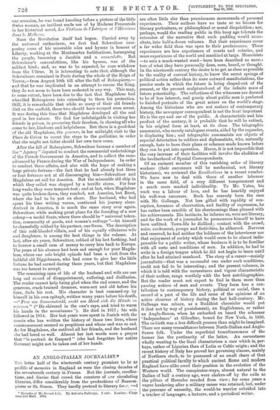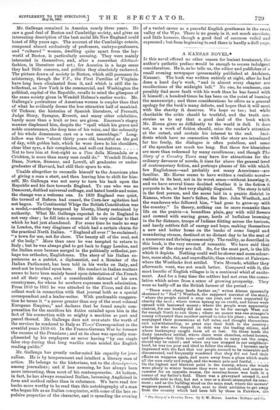AN ANGLO-ITALIAN JOURNALIST.*
THE latter half of the nineteenth century promisee to be as prolific of memoirs in England as were the closing decades of the seventeenth century in France. But the journals, recollections, and diaries that crowd the counters of t-nr circulating libraries, differ considerably from the productions of Bassompierre or St. Simon. They hardly pretend to literary for,::, nnd
are often little else than promiscuous memoranda of personal experiences. Their authors have no taste or no leisure for literary portraiture, or philosophical or moral disquisition; nor, perhaps, would the reading public in this busy age tolerate the extension of the narrative that such padding would neces sitate, into half-a-dozen volumes. But their experiences cover a far wider field than was open to their predecessors. These experiences are less experiences of courts and coteries, and more experiences of the world and mankind at large. Memoirists —to coin a much-wanted word—have been described as Tarn,. tors of what they have personally done, seen, heard, or thought. In the nineteenth century the desire is to get as close as possible to the reality of current history, to know the secret springs of political action rather than its mere outward manifestations, theprecise mode in which the future is being shaped-out of the present, or the present sculptured-out of the infinite mass of future potentiality. The reflections of the witnesses are deemed to be of less interest, and gossip about public men is preferred to finished portraits of the great actors on the world's stage. Among the historians who are not makers of contemporary history, the newspaper correspondent is not the least important He is the eye and ear of the public. A characteristic and late product of the century, it is probable that he will be extinct, in his original form at least, at its close. The telegraphic summarist, who merely catalogues events, aided by the expander, is displacing him ; and telegraphic summarists are objects of especial detestation to soldiers and diplomatists, who, naturally enough, hate to have their plans or schemes made known before they can be put into operation. Hence, it is not impossible that the very increase of their facilities will involve the abolition of the brotherhood of Special Correspondents.
Of an eminent member of this vanishing order of literary workers (their successors will be mechanical, not literary historians), we reviewed the Recollections in a recent number. We have now to deal with those of another labourer in the same field, of a very different temperament and a much more marked individuality. To Mr. Yates, his work was a labour of love, and he has heartily enjoyed his well-won successes. Such has scarcely been the case with Mr. Gallenga. Not less gifted with rapidity of conception, keenness of observation, and facility of expression, he has rather been sensible of his shortcomings than pleased with his achievements. His instincts, he informs us, were not literary, and for the work of a journalist he pronounces himself to have been unfitted. Town-life he disliked ; contact with the crowd, noise, excitement, pomps and festivities, he abhorred. Nervous and reserved, he had neither the boldness of the interviewer nor that enjoyment of society which would seem to be almost indispensable for a public writer, whose business it is to be familiar with all sorts and conditions of men. In addition, he had to write in a foreign tongue which he did not begin to learn until after he had attained manhood. The story of a career—mainly journalistic—that was a successful one under such conditions, could not fail to be interesting; and the present volumes, in which it is told with the earnestness and vigour characteristic of their author, range worthily with the best autobiographies. But the reader must not expect to find in them more than passing notices of men and events. They form less a contribution to contemporary history, political or social, than a record of a part of the life and some of the opinions of an active observer of history during the last half-century. Mr. Gallenga was reborn, as a Buddhist chronicler would put it (but not by way of punishment), an Englishman, or rather an Anglo-Saxon, when he embarked on board the schooner 'Independence' at Gibraltar, bound for New York, in 1836. The re-birth was a less difficult process than might be imagined. There are many resemblances between North-Italian and AngloSaxon folk. Under the superficial tumultuousness of the former lies the pertinacity of the latter. An earnestness wholly wanting to the Gaul characterises a race which is, perhaps, rather of Ligurian than of Latin or Celtic origin; and the recent history of Italy has proved her governing classes, mainly of Northern stock, to be possessed of no small share of that practical political faculty to which ancient Rome and modern England have alike owed their position in the evolution of the Western world. The conspirator-ways, almost natural to the Italian of half a century ago, were shaken-off by the exile as the pillars of Hercules receded from view ; for some years a vague hankering after a military career was retained, but, under the pressure of necessity, the would-be warrior subsided into a teacher of languages, a lecturer, and a periodical writer. Mr. Gallenga remained in America nearly three years. He saw a good deal of Boston and Cambridge society, and gives an interesting description of the best social life New England could boast of fifty years ago. The account of the Cambridge coterie, composed almost exclusively of professors, embryo-professors, and "cultured " women, dwelling quite apart from the layworld of Boston, is particularly amusing. They were mainly interested in themselves, and, after a somewhat dilettante fashion, in literature and art ; for America in a large sense they had little concern, and politics they absolutely eschewed. The picture drawn of society in Boston, which still possesses its aristocracy, though the F.F., the First Families of Virginia, have long been eliminated from it, and which is still the intellectual, as New York is the commercial, and Washington the political, capital of the Republic, recalls to mind the glimpses of the same society given in Wendell Holmes's earlier works. Mr. Gallenga's portraiture of American women is ampler than that of what he evidently deems the less attractive half of mankind. Of Ticknor, the historian of Spanish literature, of Prescott, Jadge Story, Sprague, Everett, and many other celebrities, barely more than a trait or two are given. Emerson's stagey manner displeased him, despite the " spell which his grave and noble countenance, the deep tone of his voice, and the solemnity of his whole demeanour, cast on a vast assemblage." Longfellow was then "about thirty years old, beautiful as the god of day, with golden hair, which he wore down to his shoulders, clear blue eyes, a fair complexion, and well-cut features Not to love him at first-sight as a Pico della Mirandola or a Crichton, is more than many men could do." Wendell Holmes, Dana, Norton, Sumner, and Lowell, all graduates or undergraduates of Harvard, had still their spars to win.
Unable altogether to reconcile himself to the American plan of giving a man a start, and then leaving him to shift for himself, Mr. Gallenga was not sorry to turn his back upon the Republic and his face towards England. To one who was no Democrat, disliked universal suffrage, and hated bustle and noise, the change was a welcome one. In 1839 England was quiet, the turmoil of Reform had ceased, the Corn-law agitation had not begun. To Continental Whigs the British Constitution was a model,—authority tempered by liberty, liberty restrained by authority. What Mr. Gallenga expected to do in England is not very clear ; he fell into a course of life very similar to that which he had just abandoned. For some time he made no way in London, the very dinginess of which had a certain charm 'for the practical North Italian. " England all over !" he exclaimed; " a town for use, not for show. The beauty all of the soul, not of the body." More than once he was tempted to return to Italy ; but he was always glad to get back to foggy London, and the Italian soon became merged in the politically orthodox, perhaps too orthodox, Englishman. The story of his Italian experiences as a patriot, a diplomatist, and a Member of the Italian Parliament, has been told in his works on Italy, and need not be touched upon here. His conduct in Italian matters seems to have been mainly based upon detestation of the French and all their ways, and a considerable distrust of his own countrymen, for whom he nowhere expresses much admiration. From 1859 to 1883 he was attached to the Times, and did excellent work in connection with that journal both as a special correspondent and a leader-writer. With pardonable exaggeration he terms it " a power greater than any of the most colossal European Empires," and declares that he found ample compensation for the sacrifices his duties entailed upon him in the fact of his connection with so mighty a machine as part and parcel thereof. Mr. Gallenga does not over-state the worth of the services he rendered to Italy as Times' Correspondent in the eventful years 1859-60. In the Franco-German War he foresaw the success of the Prussians ; and at its close was specially complimented by his employers as never having "by one single false step during that long warlike crisis misled the English reading public."
Mr. Gallenga has greatly under-rated his capacity for journalism. He is by temperament and intellect a literary man of action. He belongs to the historians, not to the aroniqueurs, among journalists; and if less amusing, he has always been more interesting, than most of his contemporaries. At bottom, in fact, he has always remained Italian, becoming Anglicised in form and method rather than in substance. We have read few books more worthy to be read than this autobiography of a man who began life as an Italian conspirator, with some of the less repulsive properties of the character, and is spending the evening of a varied career as a peaceful English gentleman in the sweet valley of the Wye. There is no gossip in it, not much anecdote, and little humour, though a good deal of sarcasm veiled and expressed ; but from beginning to end there is hardly a dull page.















































 Previous page
Previous page